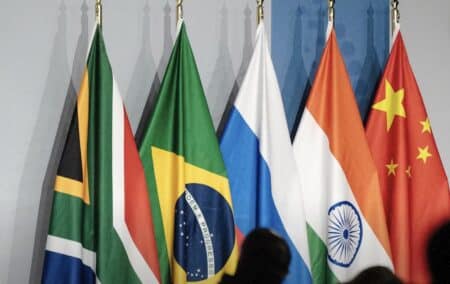BRICS leaders announced yesterday the admission of six new countries from next year as BRICS seeks to reshape the global order.
BRICS, comprising Brazil, Russia, India, China and South Africa, agreed at their 2023 summit to make Argentina, Egypt, Ethiopia, Iran, Saudi Arabia, and the United Arab Emirates full members from 1 January 2024.
‘This membership expansion is historic’, said Chinese President Xi Jinping, whose nation is the most powerful in the group of non-Western states which represents a quarter of the world’s economy.
‘The expansion is also a new starting point for BRICS cooperation. It will bring new vigour to the BRICS cooperation mechanism and further strengthen the force for world peace and development.’
Prime Minister Narendra Modi later congratulated the new members: ‘India has always supported the expansion of BRICS. India has always believed that adding new members will strengthen BRICS as an organisation’, he said.
Dr. Christopher Sabatini, Senior Research Fellow at Chatham house, says that in expanding membership, the weight of the democracies will be further diluted and the potential for Russia and China to exert greater influence over the other members will also increase.
He further says that BRICS is a platform for countries that have long felt locked out of the global system.
‘One should ask what sort of world order are some of these democracies that participate in the BRICS seeking to create that they’re willing to align themselves with blatant autocracies and autocracies that even in the case of Russia invaded a democratic country, or China, which is rattling its sabre to invade Taiwan. Are these the sorts of partners you want to hook your global ambitions to?’

